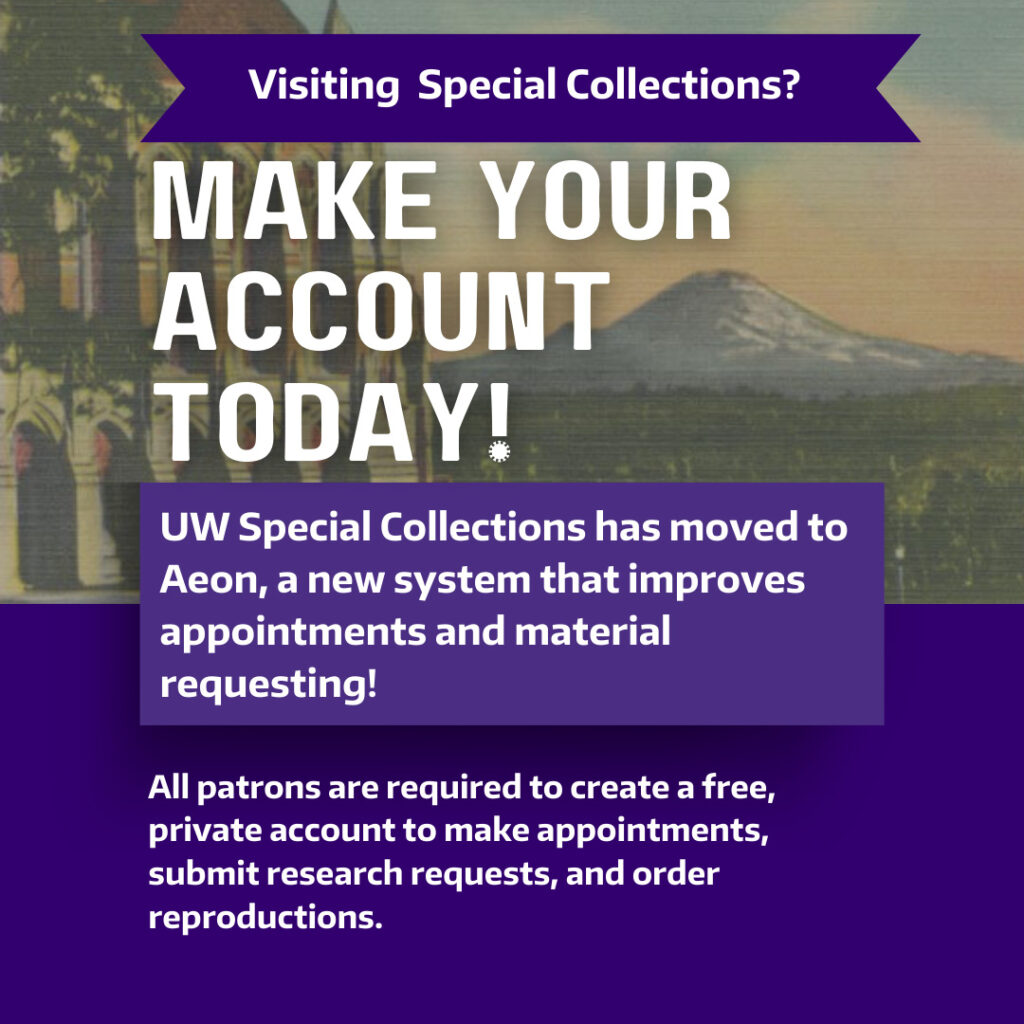Find Special Collections
Rare and Unique Resources
Special Collections holds many rare, valuable and unique items that require special security measures to assure they will be available for years to come. Visitors are welcome to view the Special Collections Lobby Exhibit or the Special Collections Reading Room Exhibit. We are also open for research to members of the UW community, visiting scholars, and the general public.
Ask Us!
Get help from librarians by email, phone, 24/7 chat, or make an appointment with a subject expert
Find Materials in Special Collections
Special Collections materials can be found in a few places. The best way to search them depends on what you are looking for.
ArchivesWest (Finding Aids)
Finding aids are detailed guides to archival and photograph collections. They can help you determine what collections or portions of a collection are relevant to your research. They include information about the creator, an overview of what is in a collection, and container listings.
UW Libraries Search
The library catalog provides brief descriptions about most publications housed in Special Collections, Special Collections’ digital collections, and some archival and manuscript collections.
Special Collections Online
Digital Collections
These are a good place to start a search as they contain a range of materials, including photographs, books, manuscripts and archives.
Digital Exhibits
These highlighted exhibits are drawn from the vast resources within Special Collections.
ResearchWorks
UW’s institutional repository disseminates scholarly work produced by members of the UW community.

Your Special Collections Account
All users must create an account in the Special Collections Request System to use Special Collections’ materials. The account is free and online, and only takes a few moments to set up! After completing your account setup, you can make appointments and request materials.
Researching in Special Collections
You have two options for accessing Special Collections materials: in person by visiting the Special Collections Reading Room or virtually using our Virtual Reading Room service.
Visiting the Special Collections Reading Room in Person
Appointments are not required for in-person visits, so long as the material is onsite and doesn’t have an access restriction. However, researchers who make appointments will have material waiting for you when they arrive!
If you doesn’t have an appointment, we’ll retrieve your material at the next scheduled retrieval time.
We retrieve materials at the following times:
- 11 AM
- 2 PM
- 3 PM
Materials take an estimated 30 minutes to be delivered.
You can make appointments in the appointment section of the Special Collections Request System or when submitting a request. For more information on how to use your account, visit the Searching and Requesting in Special Collections Research Guide.
When you arrive
You will be asked to check your coat and bags outside the Reading Room in our secure lockers.
The following items are welcome in the reading room:
- Laptops
- Phones and tablets (silenced)
- Cameras, with flash turned off
- Loose leaf papers
The following items are not permitted in the Reading Room:
- Food or drink
- Pens and other indelible writing instruments. We have pencils if you need them.
- Notebooks. We will provide loose leaf paper if you need it.
- Scanners, document cameras, tripods, flash, or other lighting equipment
- Smart glasses, such as Meta AI Glasses, Google Glass, or any other glasses with recording capabilities
Materials from outside Special Collections must be flagged by staff before they are brought in, and are subject to inspection when you leave.
Reading Room policies
To keep our collections safe, we ask that you abide by our reading room policies. Future researchers thank you for your care!
You will be given one box of archival materials at a time and provided with a “Folder in Use” marker so you can track your place in a box.
- All materials must be kept in order; you should never rearrange the contents
- The number of books we give you at a time will vary depending on how large or how fragile an item is.
- Supports for fragile materials and gloves for photographs will be provided and must be used as directed.
- Always ask staff before taking pictures or making reproductions of material. Physical condition, donor restrictions, or other concerns may prevent us from allowing reproductions to be made of items.
Accessing Materials Virtually
The Virtual Reading Room is a remote access service where staff use a specialized document camera to show you material over Zoom. The Virtual Reading Room is an access service only – if you would like research assistance, please contact [email protected] and we will be happy to assist you!
Researchers are limited to one item (one box or one volume of a book) per Virtual Reading Room appointment. You can make appointments in the appointment section of the Special Collections Request System or when submitting a request. For more information on how to use your account, visit the Searching and Requesting in Special Collections Research Guide.
The Virtual Reading Room is only equipped to show paper materials. Born digital and audiovisual materials are not something we can show at this time. In addition, some oversize material may be too large to be viewed using the Virtual Reading Room.
Logging into your appointment
After you make your appointment, you will receive a confirmation email with a Zoom link. At the time of your appointment, simply click the link and you will be able to join the appointment!
Bring Your Class to Special Collections
UW or Other College/University Classes
We welcome opportunities to teach and co-teach classes on research with Special Collections materials.
K-12 Classes
We are happy to host field trips, class visits, and research trips for students grades K-12.
